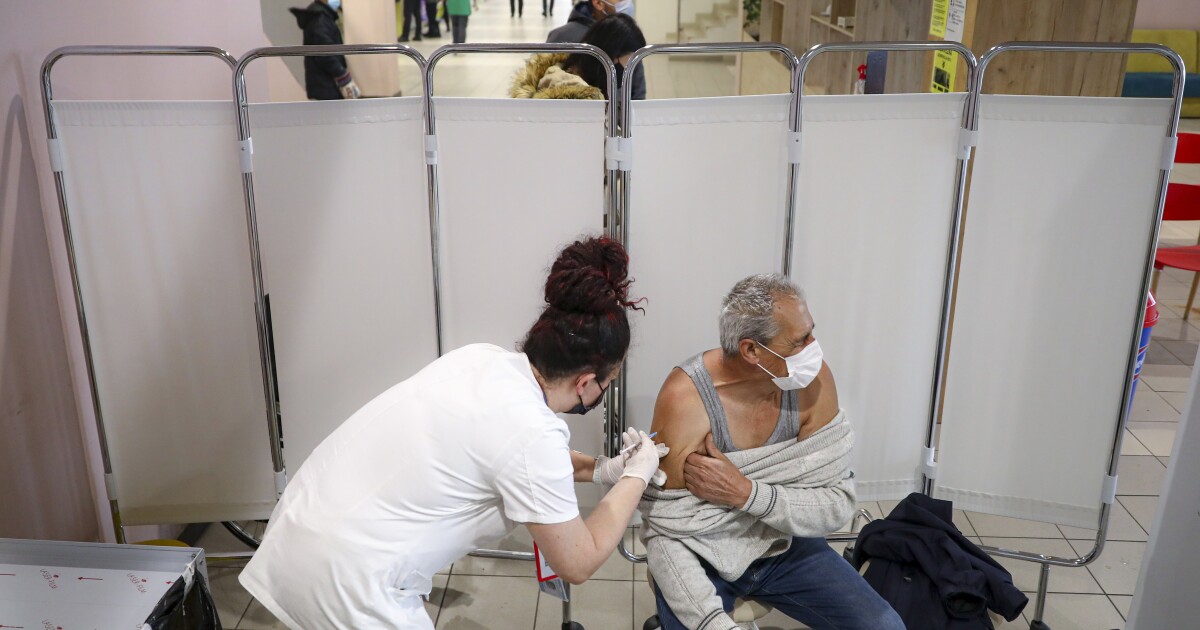Some vaccine skeptics in Eastern Europe are turning to the other side as infections rise, countries hinder the movement of the unvaccinated and authorities battle mistrust of the government and misinformation.
When he rolled up his sleeves in the Bosnian capital to receive his first dose of a coronavirus vaccine, Feta Keco feared possible adverse effects. But he says the worst thing he felt in the days that followed was “moderately uncomfortable” pain at the injection site.
More significantly, the 52-year-old freelancer has joined the global community of vaccine believers after months of “being very susceptible” to what she now describes as “the most ridiculous theories.”
She tells the Associated Press that some of them were “that the coronavirus does not exist, that journalists were being paid to spread panic, that planes were spraying viruses at night, that they were using vaccines to implant tracer microchips.”
“Now I feel relieved that I did something to protect my health after putting it in danger for a long time,” Keco said. “Also, I like that it will make my life easier if I decide to travel abroad.”
She is not alone, especially after many European countries began tightening their rules against the virus, including requiring proof of vaccination for foreign visitors. “I want to travel and study abroad and for that I have to be vaccinated,” said Esma Dzaka, 18, after receiving her first dose on Tuesday in Sarajevo.
This week, health authorities in the Bosnian capital stepped up their efforts to apply coronavirus vaccines as widely as possible, hampered so far by public mistrust and a wave of misinformation. They began sending nurses to dispense the vaccines at city council offices and shopping malls across the city in the hope that easy access would persuade more to receive them.
Sarajevo’s top health official, Haris Vranic, said he thought some vaccine skeptics had started to change their minds recently, not only because they want to travel freely abroad, but also because “the numbers don’t lie.”
The statistics are clear: between 92% and 94% of our people who died in the third and the (current) fourth waves of COVID-19 were not vaccinated, ”he said.
Bosnia, still struggling to recover from a devastating ethnic war in 1992-1995, has so far inoculated less than a quarter of its 3.3 million people, one of the lowest vaccination rates in Europe.
But while such a level of distrust in vaccines, which have been widely available since late spring, might be surprising in a poor, corruption-riddled and ethnically divided country like Bosnia, similar problems plague the Balkan neighbors. including members of the European Union.
In Romania, an EU country of about 19 million inhabitants, the vaccination rate was around 28% until mid-October, when a sharp increase in contagion and deaths forced some hospitals to place body bags in their homes. corridors after morgues ran out of space.
The fear – combined with stricter anti-virus measures introduced by authorities, including a nightly curfew and a requirement for proof of vaccination, recent recovery from COVID-19 or recent negative test to enter most public facilities – has done raise vaccination rates in Romania above 40% by December 10, according to Our World in Data.
“I was scared, there are so many (negative) rumors” about vaccines, said Ofelia Gligor, who received her first dose this week at the main vaccination center in Sighisoara, a small historic Romanian town 300 kilometers (185 miles) north of Bucharest, the capital.
The 18-year-old nursing student had to overcome her fears for practical reasons: Without proof of vaccination, she would not be allowed to participate in the local hospital’s training program.
“My advice to people now is to get vaccinated, because sooner or later vaccinations will be mandatory” for everyone, he says.
A similar situation occurred in Croatia, which joined the EU in 2013. Amid a large increase in daily infections and deaths, the authorities implemented a vaccination mandate on November 19 for all public sector employees and all the citizens who use their services.
Despite sporadic protests against the COVID-19 restrictions, the vaccination rate in Croatia has been climbing more than 1.2% per week, to reach 55% of its population of 4.2 million on December 11.
In Bosnia, where jurisdiction over handling the pandemic is divided between 14 different levels of government that do not always point in the same direction, the introduction of COVID-19 passes remains on hold. Although the mandates for the use of masks and social distancing continue, their compliance is uneven.
Bosnia has recorded 12,900 deaths from COVID-19, but for some, like Keco, it took more than death statistics to accept the reality of the pandemic. It required a dispute with his daughter, Mahira.
“She told me: Mom, the vaccines work 100%. Millions of people are vaccinated now and they are fine, don’t be silly “, Keco recalls, adding that a friend of his son-in-law – who had said that” he did not get vaccinated or died “- was infected with COVID-19” and left him destroyed ”.
“I finally realized that I had to get vaccinated if I wanted to feel safe,” she said. “The people and what they said drove me crazy. For a time at least, I believed all his silly stories. “
___
Eldar Emric in Sarajevo, and Stephen McGrath in Sighisoara, Romania, contributed to this report.
–

:quality(80)/cdn-kiosk-api.telegraaf.nl/13f530fa-5e89-11ec-b9e8-0255c322e81b.jpg?resize=150%2C150&ssl=1)